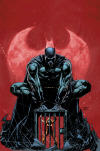Welch on Addictions
Topic: The Long War

Reading: Batman: Bruce Wayne - Fugitive
Enjoying: leftover frozen pizza
Listening: keeping it quiet
Dr. Ed Welch seeks to display just how addiction relates to other categories of sickness and sin, while also operating in human behavior.[1] His insights are both penetrating and convicting, while being very much on the level and largely free of technical terms. While rejecting an either/or approach of viewing addiction as merely sin or sickness, Dr. Welch shows how the Scriptures portray sinful addictions as voluntary slavery.[2]
While it is true that we choose to sin, and take selfish, prideful delight in our willfullness, there is also a sense in which sin is a cruel taskmaster, forcing us to do the very things we hate and do not wish to do. After analyzing the various biblical data regarding the subject, Dr. Welch proposes a definition for addiction that he hopes does justice to the varying degrees of addiction:
Addiction is bondage to the rule of a substance, activity, or state of mind, which then becomes the center of life, defending itself from the truth so that even bad consequences don't bring repentance, and eventually leading up to further estrangement from God."To locate it on the theological map," he continues, "look under sin."[3]
He also uses several charts, graphs, and visual keys to help convey that addiction accounts for both the influences on our heart, such as nature and nurture, while also taking the heart - and its inherent wickedness - itself into consideration, as we eagerly seek to idolize our own desires. Within our hearts, sin can act at once high-handed, purposeful, and rebellious, and yet simultaneously feel enslaved, out of control, and automatic. Finally, he graphs sin practiced in time (the x axis) against the amount of pain, loss/loneliness, and despair felt by the individual (the y axis) to show that initially we have sin by itself; then it is joined to a sense of slavery; finally the sin and slavery combine to join tragedy in its unholy union.[4] Dr. Welch vividly portrays the full extent of sin conceiving and giving "birth" to death, as James records in the NT.
But is it possible for an addiction to start as sin, and progress into something more, to evolve into a disease? Dr. Welch argues no. While he acknowledges that at certain levels it can seem to make sense, as time and pain progress, this model of sin-to-disease fails to account for all the data. He notes, "Heavy drinkers and other addicts genuinely feel out of control, but they are also making choices rooted in their own self-centeredness and pride. Since this is an apparent paradox, we tend to emphasize one or the other. Theology, however, keeps us balanced."[5] While a hard word to hear, Dr. Welch maintains that no victim of addiction (in the first person) is ever not also culpable.
Dr. Welch encourages a few ideas as we face our own addictions:
- In Matthew 9:1 - 8, Jesus heals both body and soul, but the point is that the forgiveness of sins is the deeper, more pertinent issue. Trust in Christ for the forgiveness of sins and the restoration of the body.
- Recognize the spiritual core of our addictions. Search to see how our addictions prevent spiritual growth, fear of the Lord, and personal holiness.
- Practice confession of sin, daily if possible. Allow God's Word "to deepen and refine" your definition of sin and what it meants to confess and repent. Remember that He is faithful and just and will forgive sin.
- When feeling hopeless and joyless, often the biblical authors would confront their own sin in repentence. Though painful, genuine sorrow and confession often brought hope and joy in the Lord as a result.
- Addictions are incredibly serious, and yet incredibly common to man. Consider similarities in the addictions you see in yourself and in others, and pray for each other. Encourage and help each other. Refrain from hypocrisy and judgmental attitudes.[6]
__________________________________
Footnotes
[1]Welch, Edward T. Addictions: A Banquet in the Grave (P & R Publishing, 2001). Back
[3]Ibid. p. 35; emphasis original. Back
Labels: the long war






Brother, thank you for this great post. Very helpful in my current thinking on sin, addiction, repentance. I have been planning on reading Welch's book and this has just given me a good foretaste!
Posted by Jason Kovacs |
5/28/2006 12:15:00 PM
Jason Kovacs |
5/28/2006 12:15:00 PM
That was a VERY interesting one! Seriously interesting.
Posted by Dr. Pawan Kumar Singh |
5/10/2018 04:51:00 AM
Dr. Pawan Kumar Singh |
5/10/2018 04:51:00 AM
That is great to hear, thank you for reading!
Posted by Dengue Fever |
6/23/2018 12:49:00 AM
Dengue Fever |
6/23/2018 12:49:00 AM